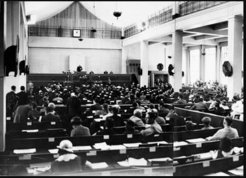On the international origins of European economic integration: the legal legacies of the League of Nations, 1919–1957
PhD project

The interwar period witnessed tremendous developments of international and regional institutions. In 1919, the League of Nations was established to promote international peace, cooperation and security. However, the founding fathers of the League did not intend to devote it to regulating international trade. Based on this consideration, the League’s experiences on promoting free trade during the interwar period were often neglected in the historical narrative of international economic law. Nevertheless, recent scholars have reappraised the League’s contribution by highlighting the intricate relationship between the multilateral trade framework during the interwar period and its legal heritage on subsequent regional economic integration. A growing number of researchers even argue that the activities of international organizations during the interwar period contributed to the process of European integration, which resulted in the establishment of the European Economic Community (EEC) in 1957. This contrasts with the conventional accounts given by ‘Euro-lawyers’, who since the late 1950s have asserted the ‘sui generis’ nature of the European integration, thus distinguishing it from international law to a large extent.
This PhD project thus aims to examine how international economic law during the interwar period shaped European economic integration after the Second World War. It investigates how the idea of free trade was promoted by focusing on the roles played by international organizations, the legal norms established in international trade conventions and the professionals who promoted and/or practiced these norms. This project posits that international economic law during the interwar period partly influenced the foundation of the European common market in the 1950s. For instance, the colonial preferences in international trade agreements during the interwar period were perpetuated in the founding stages of the EEC, which later became the European Union (EU). The idea of forming a Customs Union, which profoundly influenced the EU’s external trade relations, can also be traced back to the dynamic interactions between international organizations and European states in the 1930s.
On the methodological level, this project will employ an interdisciplinary approach by combining history and law. It will first examine the archives of international organizations that played active roles in regulating the international economy, such as the Economic and Financial Organization (EFO) in the League of Nations, the International Labor Organization (ILO) and the International Chamber of Commerce (ICC). Second, by focusing on the individuals who actively promoted trade liberalization during both the interwar period and the founding stage of the EEC, this research will investigate how the legal legacies of the League were perpetuated after the Second World War through the practices of lawyers, economists and diplomats, and how their experiences shaped the process of European economic integration. By situating the EEC as an international organization after the Second World War, this project provides a historical contextualization of the legal legacies of the League of Nations and how ‘supranational’ law became possible through international law during the interwar period.
